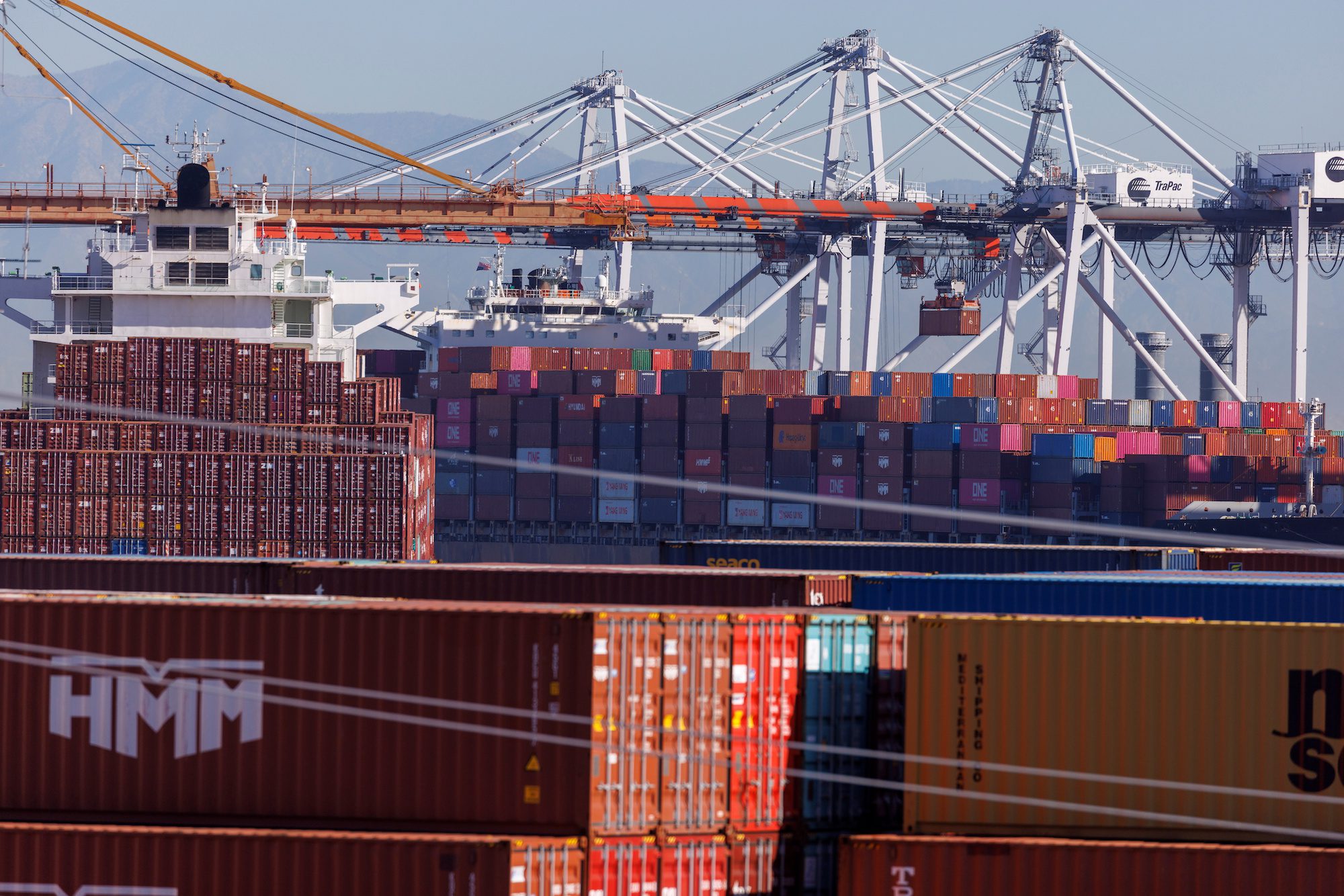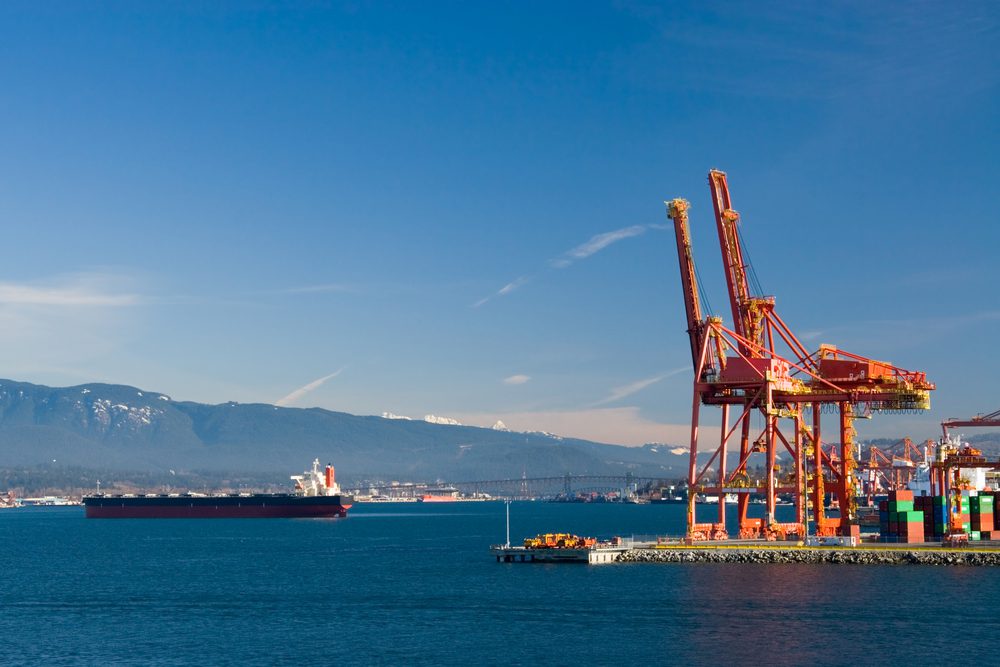The U.S. House of Representatives has voted 369 to 42 to pass the Senate’s version of the bipartisan Ocean Shipping Reform Act, designed to give the government’s shipping competition commission with greater authority to help U.S. exporters. President Biden has indicated he is eager to sign the bill into law.
The bill, which was introduced in the Senate in February by Senator Amy Klobuchar (D-MN) and passed unanimously at the end of March, gives the Federal Maritime Commission (FMC), the independent federal agency responsible for the regulation of international ocean shipping, greater authority to regulate certain ocean carrier practices and to promote the growth and development of U.S. exports “through a maritime system that is transparent, efficient, and fair.” Text of the bill can be found here.
For example, the bill requires the FMC to investigate complaints about detention and demurrage charges charged by ocean carriers, increasing the efficiency of the complaint process, and gives the FMC the ability to order refunds for unreasonable charges. It also prohibits common ocean carriers, marine terminal operators, or ocean transportation intermediaries from unreasonably refusing cargo space when available, or resorting to other unfair or unjustly discriminatory methods or retalitory business practices. It also establishes a shipping exchange registry through the FMC.
The legislation has been touted as the first major update to federal regulations for the global ocean shipping industry in over two decades, coming as surging consumer demand for retail goods throughout the COVID-19 pandemic has overwhelmed U.S. ports and supply chains.
While the bill could make some improvements particularly for U.S. exporters, such as agricultural exporters, it is unlikely to be the silver bullet that will solve supply chain congestion or lower high freight rates that have increased costs for U.S. consumers. It’s also not clear if the bill will give the FMC with enough regulatory authority to implement all 12 of FMC Commissioner Dye’s final recommendations or any initial recommendations not yet implemented from her two-year fact finding investigation into ocean shipping supply chain issues during the COVID-19 pandemic.
Similar legislation was led in the House by Representatives John Garamendi (D-CA) and Dusty Johnson (R-SD) and passed the House with overwhelming bipartisan support in December.
Reactions
Daniel B. Maffei, Chairman and Commissioner of the U.S. Federal Maritime Commission (FMC):
I applaud today’s passage of the Ocean Shipping Reform Act of 2022 by the U.S. House of Representatives and look forward to this legislation being signed into law.
The strong bipartisan and bicameral support in Congress to act and address the multitude of challenges U.S. shippers—especially exporters—have faced over the past two years is impressive. Lawmakers heard clearly the calls for help from American manufacturers, farmers, and companies that rely on access to international ocean cargo services.
This bill provides needed and overdue updates to the laws the Federal Maritime Commission enforces. These changes will have a beneficial effect on how U.S. shippers are served and will bring more accountability to how ocean cargo services are provided. We will move promptly to implement the steps necessary to bring shippers the benefits of this legislation, beginning with the rulemaking addressing export shipments.
The leadership demonstrated by Representative John Garamendi in identifying the necessity for this legislation, and his commitment to seeing it through to the President’s Desk is especially deserving of recognition and commendation. His efforts to build a coalition within the House that ensured OSRA’s passage was deft and skilled. He had a willing and equally capable partner in his colleague and original co-sponsor Representative Dusty Johnson.
Today’s milestone would not have been possible without the efforts of Senators Klobuchar and Thune who co-sponsored the Senate version of OSRA, and Chair Cantwell and Ranking Member Wicker of Committee on Commerce, Science, and Transportation who worked cooperatively to successfully move this legislation forward.
OSRA will provide the FMC with enhanced authority to ensure industry players have the right incentives and that all stakeholders in the ocean freight transportation system can have a voice. We are grateful for all those who have contributed to making the Commission a more robust and capable entity.
President Biden:
Lowering prices for Americans is my top priority, and I applaud the Congress for passing the Ocean Shipping Reform Act on a bipartisan basis, which will help lower costs for American retailers, farmers and consumers. I want to thank Senator Klobuchar, Senator Thune, Rep. Garamendi, and Rep. Dusty Johnson for their leadership and helping drive forward this important legislation.
In my State of the Union address, I called on Congress to address ocean carriers’ high prices and unfair practices because rising ocean shipping costs are a major contributing factor to increased costs for American families. During the pandemic, ocean carriers increased their prices by as much as 1,000%. And, too often, these ocean carriers are refusing to take American exports back to Asia, leaving with empty containers instead. That’s costing farmers and ranchers—and our economy—a lot of money.
This bill will make progress reducing costs for families and ensuring fair treatment for American businesses—including farmers and ranchers. I look forward to signing it into law.
World Shipping Council:
“Today’s vote on The Ocean Shipping Reform Act (OSRA) marks the conclusion of the legislative phase and transition to the Federal Maritime Commission rulemaking process. We appreciate the time and effort that Congress has put into crafting this bill and look forward to engaging in productive conversations with the Federal Maritime Commission to implement OSRA in a way that will minimize disruption in the supply chain.
“Throughout the COVID-19 pandemic, ocean carriers have gone all-out to keep goods moving, deploying every vessel and every container available, increasing sailings, and investing for the future. In 2021, carriers ordered a record-breaking 555 vessels worth 42.5 Billion USD, and 208 vessels worth 18.4 Billion USD have been ordered year-to-date in 2022. But as long as America’s ports, railyards and warehouses remain overloaded and unable to cope with the increased trade levels, vessels will remain stuck outside ports to the detriment of importers as well as exporters.
“We are appalled by the continued mischaracterization of the industry by U.S. government representatives, and concerned about the disconnect between hard data and inflammatory rhetoric. The 22 (not nine) international carriers that serve the American people, industry and government on the Asia – United States trade are part of the global supply chain that has built this country, importing and exporting food, medicine, electronics, chemicals, and everything else we depend on. The increased rate levels we have seen over the past years are a function of demand outstripping supply and landside congestion, exacerbated by pandemic-related disruption. The United States’ own Federal Maritime Commission’s recent Fact Finding 29 investigation conducted over the past two years concluded the same: ’Our markets are competitive and the high ocean freight rates have been determined by unprecedented consumer demand, primarily in the United States, that overwhelmed the supply of vessel capacity. Congestion further constrained available capacity.’
“Until the import congestion is remedied, export congestion will persist. The World Shipping Council will continue to work with federal and state policymakers, as well as other parties, to pursue the necessary lasting solutions – such as continued investment in port infrastructure – that can have real impact in strengthening the intermodal transportation system that has supported the U.S. economy through the pandemic. Ocean carriers continue to move record volumes of cargo and have invested heavily in new capacity – America needs to make the same commitment and invest in its landside logistics infrastructure.”
Michael Dykes, D.V.M., President and CEO of the International Dairy Foods Association:
On behalf of the U.S. dairy industry, I want to thank bipartisan members of Congress in the House and the Senate for working together pass the Ocean Shipping Reform Act, which should provide important tools to address supply chain bottlenecks plaguing U.S. dairy and food exports. With President Biden expected to sign the bill into law in the coming days, the Act provides real, long-term solutions for the many issues congesting U.S. ports and slowing U.S. dairy exports. The bill places disciplines on ocean carriers’ ability to decline export cargo, meaning more of those empty containers will soon be filled with high-quality, sustainable U.S. dairy foods for consumers around the world. The Act also puts guardrails around when demurrage can be charged, helping to get U.S. dairy exports on the water in a timelier manner. And the bill strengthens the oversight authority of the Federal Maritime Commission over ocean carriers, the majority of which are foreign owned with little incentive to fill empty containers with U.S. dairy exports. The Ocean Shipping Reform Act would not have been passed without the bipartisan leadership of Senators John Thune (R-S.D.) and Amy Klobuchar (D-Minn.) who introduced the bill in the Senate, and Reps. John Garamendi (D-Calif.) and Dusty Johnson (R-S.D.) who championed the measure in the House. The bill has received dozens of bipartisan sponsors and passed by a wide margin in both chambers.
“Earlier this year, IDFA entered into an alliance with the Port of Los Angeles and shipping company CMA CGM to identify and address supply chain issues hindering U.S. dairy product exports. Working together, the IDFA Dairy Exports Working Group has removed obstacles for U.S. dairy exports departing from West Coast ports, created programs and incentives dedicated to moving U.S. dairy exports with greater urgency, improved communication between dairy companies and shippers, and begun talks on long-term investments in interior transit solutions.
“Unlike 20 years ago, the U.S. dairy industry today is the third-largest dairy exporting nation in the world. We need America’s transportation and export systems to pave the way for the United States to become the world’s leading supplier of high-quality, affordable, dairy nutrition within a decade. IDFA is confident this bill is a step toward that goal and is looking forward to working with the Federal Maritime Commission on its implementation.”
American Farm Bureau Federation President Zippy Duvall:
“AFBF appreciates lawmakers for working together to pass the Ocean Shipping Reform Act. Record-high shipping costs and delayed access to containers have worsened supply chain issues and limited exports at a time when the world is calling on America’s farmers to meet growing demand. Some estimates suggest we’ve lost out on more than $25 billion in agricultural exports over the past six months because of ocean shipping constraints. That’s unacceptable. Limited trade has also made it more difficult to import supplies like fertilizer, which increases costs to farmers and ultimately hurts all families through higher grocery bills.
“I was pleased to team up with President Biden to urge passage and look forward to him quickly signing the Ocean Shipping Reform Act into law so farmers and ranchers can continue to meet the needs of families in America and overseas.”
Peter DeFazio (D-OR) Chair of the House Committee on Transportation and Infrastructure:
“The Ocean Shipping Reform Act of 2022 will make tangible improvements for Americans exporters, easing our international supply chains and helping keep prices down for consumers. This critical legislation will build on actions that House Democrats and the Biden administration have already taken to alleviate our congested ports and boost competition, including passing the Bipartisan Infrastructure Law and sending the Water Resources Development Act of 2022 to the Senate. I commend Congressman Garamendi, a member of the Transportation and Infrastructure Committee, for his leadership and tireless efforts on this critical legislation. I look forward to seeing President Biden sign the bill into law.”
National Retail Federation, Senior Vice President for Government Relations David French, said:
“Retailers and thousands of other businesses depend on the global maritime transportation system to move goods through the supply chain every day and continue to face significant challenges, including unfair business practices by ocean carriers. Making OSRA federal law helps address longstanding systemic supply chain and port disruption issues that existed well before the pandemic by providing the Federal Maritime Commission the additional authority it needs. Additionally, it provides critical updates to the international maritime transportation system, which has been severely impacted by COVID-19.
“We commend Congressmen John Garamendi and Dusty Johnson and Senators Amy Klobuchar and John Thune for their bipartisan leadership on this important legislation.
“These improvements come at a time when inflation has reached a 40-year high. NRF has championed the effort to pass OSRA as one of the steps necessary to Lower Inflation Now and ease pressure on American businesses, workers and consumers. It serves as the final piece of NRF’s Save Our Shipments grassroots campaign. The targeted advocacy effort focused on legislative solutions to address the retail industry’s supply chain challenges, including passing the bipartisan infrastructure bill and adding more truck drivers to the workforce.”
U.S. Senator Maria Cantwell (D-Wash.), Chair of the Committee on Commerce, Science and Transportation:
Consumers are tired of higher prices and farmers are tired of skyrocketing shipping costs. Some products have been left at the docks to rot. That’s why we passed this bill to give the Federal Maritime Commission the tools it needs to cut down on extraneous shipping costs and stop shipping carriers from leaving American products like apples, hay, milk and potatoes behind.”
Unlock Exclusive Insights Today!
Join the gCaptain Club for curated content, insider opinions, and vibrant community discussions.

 Join The Club
Join The Club













